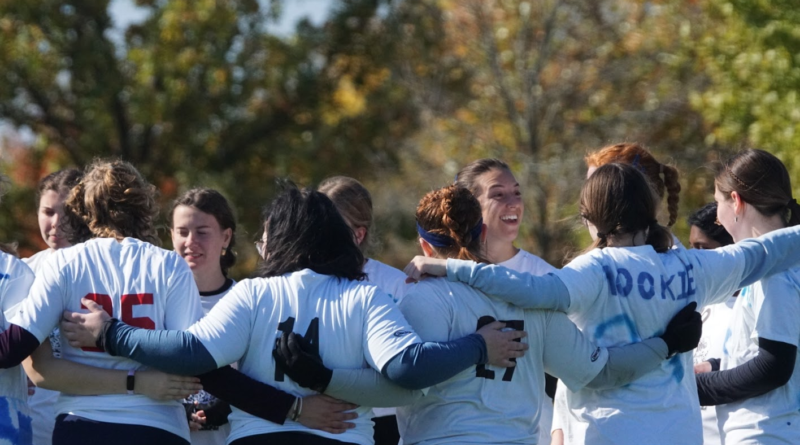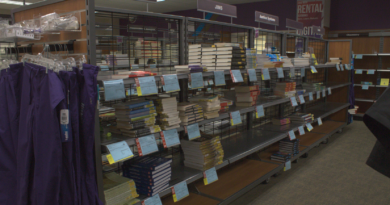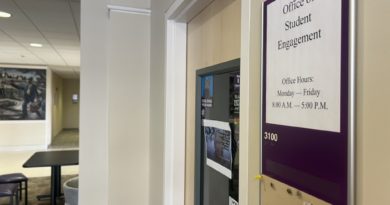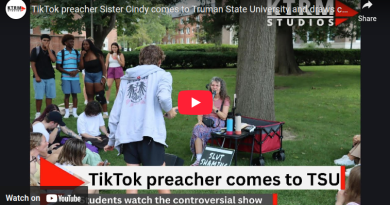Club sports experience limited access to fields
Club sports are a big part of the campus environment, however, some teams have been left to look outside of campus and pay to rent fields to continue their sport. Stokes Stadium is the only field at Truman State University that has stadium lights. This makes it highly desirable for all field sports teams, especially teams that practice at night. However, the field is incredibly difficult to reserve with varsity sports having a priority on the field.
One of these teams is the women’s ultimate frisbee team, TSUnami. Since varsity sports have first dibs, TSUnami was originally assigned the soccer fields next to the Campbell Apartments from 6:30 p.m. to 8:30 p.m. behind Centennial Hall by Truman’s Student Union, but since there are no lights at this field, playing and practicing is not possible during this time. To continue practicing, they have been forced to pay out of pocket to reserve the Kirksville High School baseball fields.
Colleen O’Reilly, president of TSUnami, spoke about the frustrating situation her organization is in.
“We’re using our own money because FAC (Funds Allotment Council) didn’t give us enough money to pay for our tournament fees and housing and gas. We didn’t apply for any field money because we assumed we would get a field we could use. I absolutely believe Truman prioritizes varsity sports,” O’Reilly said. “We are all students here, we all pay the same athletics fee as any varsity athlete and our club doesn’t get to use the same fields or facilities that we are paying for.”
The athletic fee that was incorporated into all Truman students’ tuition allots 10-30% of its budget to club sports. The fee collected a little more than $300,000 this year leaving up to $100,000 to fund club sports and the rest going to varsity athletics. However, O’Reilly believes this money hasn’t been allocated efficiently.
“The lights on Stokes was something that happened due to the Athletic Fee Accountability Committee and the fee that every student pays,” O’Reilly said. “We should be able to use that field just like any other sport does.”
Peter Young, the co-interim director of athletics, was unaware of TSUnami’s field situation and seemed shocked to find out that TSUnami was paying out of pocket.
This is the first year Young is in this role after Jerry Wollmering, the longest-serving director of athletics, stepped down three months ago to take a job at the University of Northern Iowa.
“I feel bad that a student organization has to go and pay for a facility off campus somewhere else,” said Young. “But it’s hard for us because we have three teams that have to use [Stokes Stadium] from 3:00 p.m. to 10:30 p.m. It’s the only one with lights, but there is the grass soccer field, there’s our re field and then there is the rugby field which are all open surfaces. There’s no lights but there’s enough daylight to use.”
Stadium lighting for one field would cost between $250,000-300,000, according to Young, and this would have to be a long-term project. Mike Garzanelli, comptroller at Truman State, explains that the bylaws of the athletic fee disallow multiple long-term projects to make sure students see the money spent during their time at Truman and see benefits from the money they spend.
The turf for the softball field is still being paid off, leaving the school unable to commit to spending for a project like this. However, portable lights are a possible alternative.
“Portable lights would be an option — I’ve mentioned with Laura Bates about possibly doing that if it’s within the realm of what they want to spend the money on doing, because I have no problem with getting portable lights for the REC facility,” Young said. “I think it’d be nice to have club sports be able to practice into the evening or the nighttime without having to rent something off campus.”
Laura Bates, director of the student union and campus activities, said the portable lights were a newly developed idea and were unaware of how good they were or how feasible they would be for the REC and club sports.
Portable field lights are diesel-powered and could hurt the environment along with requiring constant money for the fuel and the noise that comes with the engine making them a questionable alternative.
Truman currently has no plan on lighting any other fields on campus for teams like TSUnami, whose season runs deep into the first semester when the sun falls sooner the day. TSUnami is upset by the fact that they were given the short end of the stick when it comes to campus facilities. Young spoke about how he felt about the frustration felt by club sport athletes.
“I understand being upset about it, and I get it’s University property, and I get that those students helped pay for those things, but varsity student-athletes are paying that same fee. The soccer field we used in the past was deemed unplayable,” Young said.
According to Bates, the NCAA had closed the old soccer field that TSUnami was assigned due to poor drainage. Young was unsure what it would take to make the field playable, but he said his team is working with Truman’s Physical Plant to get someone to tell them what they need to do to make the field playable and able to host games again.
“With current enrollment, we don’t have as much fee money as we used to and the money for these things doesn’t just come overnight,” Young said. “For me, I am the co-interim director of athletics and we oversee varsity athletics. I don’t deal with club sports — that’s a REC or a student life issue. I don’t think varsity is looked at as more important. Everyone pays the same tuition and that money goes to the same aspects. My job is to look out for the best interests of my teams. Although I don’t want to deter the experience of others, I’m going to do what needs to be done, within reason, to help the varsity best compete.”




